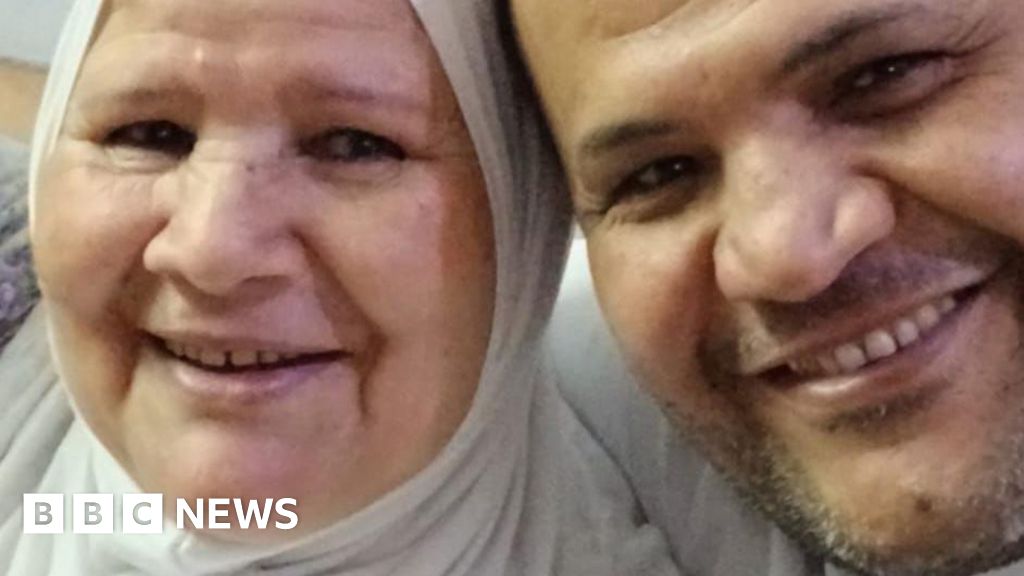Deaths due to heat during Hajj: Egyptian pilgrims “completely abandoned”

- Author, Sally Nabil
- Role, BBC Arabic
- Report from Egypt
Hundreds of people are believed to have died in the scorching temperatures during the Hajj pilgrimage in Saudi Arabia. The victims come from more than two dozen countries, with most of the fatalities coming from Egypt. The BBC visited a community there that lost more than 20 people.
Many Egyptian pilgrims come from poor villages. They spend all their savings on the spiritual journey to the holiest city in Islam.
Effendiya, a 70-year-old mother of five from the northern province of Menoufiya, sold her jewelry to pay for her trip, her youngest son Sayyed tells me, but she died while performing her rituals.
“My mother’s death broke me,” he says, breaking into tears. He explains that participating in the Hajj was his mother’s biggest dream.
Effendiya, a widow, traveled to Mecca on a tourist visa, not an official Hajj visa.
She was among the hundreds of thousands of unregistered pilgrims who wanted to fulfill their religious obligation this year without obtaining a special Hajj permit.
Saudi authorities viewed these unofficial visits as a violation of their regulations, but the process of obtaining official Hajj permits can sometimes be costly or complicated.
“She couldn’t stand the scorching heat”
Joining an official Hajj convoy in Egypt – a country in deep economic crisis – can cost around $6,000 (£4,700) per person.
Effendiya’s trip was arranged through a local agent who charged her half that amount but promised her five-star service, her family said.
The reality was completely different, they say.
On Arafat Day, which falls on June 15 this year, pilgrims gather from sunrise to sunset on Mount Arafat – about 20 kilometers from Mecca – to pray and preach.
“The bus dropped her off about 12 kilometers from Mount Arafat and drove off. She had to walk the whole way,” says Tariq, Effendiya’s eldest son.
“Whenever I video called her, she would pour water on her head. She couldn’t bear the scorching heat.
“The last time we spoke on the phone, she looked exhausted.”
Pilgrims usually stay in air-conditioned tents, are transported between holy sites by bus and receive medical care.
Sayyed says Effendiya and other unregistered pilgrims “did not have any of these facilities, they were completely deserted.” He adds that they tried to protect themselves from the scorching heat by building a tent out of bedsheets.
Her family said they had not been able to contact the agent who arranged her trip.
Hajj is one of the main pillars of Islam. Muslims must take part in it once in their lifetime – provided they are financially and physically able – and believe that they will return from the pilgrimage cleansed of their sins.
It is one of the largest annual religious gatherings in the world. Almost two million pilgrims have travelled to Mecca this year.
But none of them would have set out with the expectation that the journey would end with their own death.
“I just wish I was with her”
Egyptian authorities say many of the deceased pilgrims are unregistered, making it difficult to establish an official death toll. The Foreign Ministry said it would take more time and effort to identify the dead and contact their families.
Egyptian Prime Minister Mostafa Madbouly has announced that the activities of all travel companies involved in sending unregistered pilgrims to Saudi Arabia will be investigated.
“Without my mom, I’m scared,” says Manal, Effendiya’s eldest daughter, with eyes full of sadness.
She remembers that the moment she received the news of her mother’s death, she started screaming.
“Just before she died, she called my brother and told him that she felt like her soul was leaving her body. I just wish I could have been with her then,” Manal tells me, tears rolling down her cheeks.
Effendiya died as she lay in the shade of a street corner to catch her breath.
Her heartbroken children find some consolation in the fact that she was buried in Mecca.
“She hoped to die and be buried in the Holy City,” says Manal.



